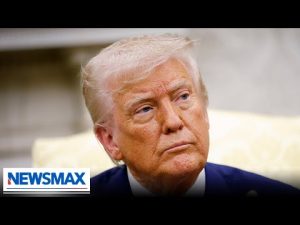Israeli Prime Minister Benjamin Netanyahu is set to travel to Washington for a crucial meeting with President Trump. This marks the second sit-down between the two leaders since Trump reclaimed the Oval Office. The meeting promises to be significant, especially since it touches on some pressing issues, including tariffs and Middle Eastern tensions.
One of the hot topics on the agenda is the 17% tariff currently imposed on Israeli goods. This tariff is akin to throwing a wet blanket on the economic relationship between the two nations, and both leaders seem motivated to clear that away. Netanyahu has already made waves by announcing that Israel will eliminate all remaining customs duties on U.S. products. He believes this move will not only open markets but also help lower the cost of living in Israel and bolster the U.S.-Israel relationship even further.
As anticipation builds for the meeting, experts are chiming in with their forecasts. International banking commentator Simon Munk expressed optimism, suggesting that the discussion might lead to a reduction of the tariff to 10%, or possibly a complete cancellation. That kind of trade agreement would certainly be music to the ears of businesses on both sides. After all, who wouldn’t want to shop without the added sting of tariffs?
Apart from economic discussions, the meeting will also focus on the delicate issue of hostages in Gaza. Among the 59 hostages are five Americans, and Netanyahu has indicated that Israel is ramping up military pressure on Hamas. The hope is that this intensity might pave the way for negotiations that could lead to the safe return of hostages and possibly the surrender of Hamas. A hefty agenda, indeed!
Iran’s nuclear aspirations are also a looming concern for both leaders. While Tehran has expressed a willingness to engage in indirect talks with the U.S., President Trump prefers to keep it straightforward and direct. He has even gone so far as to threaten Iran with potential military action and secondary tariffs if they don’t comply. Additionally, recent reports suggest the U.S. has sent a second missile defense battery to Israel, underscoring the gravity of the situation in the region.
Lastly, not to be overlooked are the discussions regarding the International Criminal Court and Israeli-Turkish relations. Ties between Israel and Turkey have seen better days, and Israel aims to ensure Syria does not become a breeding ground for threats on its northern border. The stakes are high, and Netanyahu is poised to address these tensions head-on, all while fostering a robust alliance with the U.S.
With so many critical issues on the table, the upcoming meeting between Prime Minister Netanyahu and President Trump promises to be a pivotal moment for both nations. They will be working together, hopefully paving the way for stronger economic ties and enhanced security in a region rife with challenges. It’s a full plate, but one that could ultimately lead to positive changes and an even stronger partnership.







